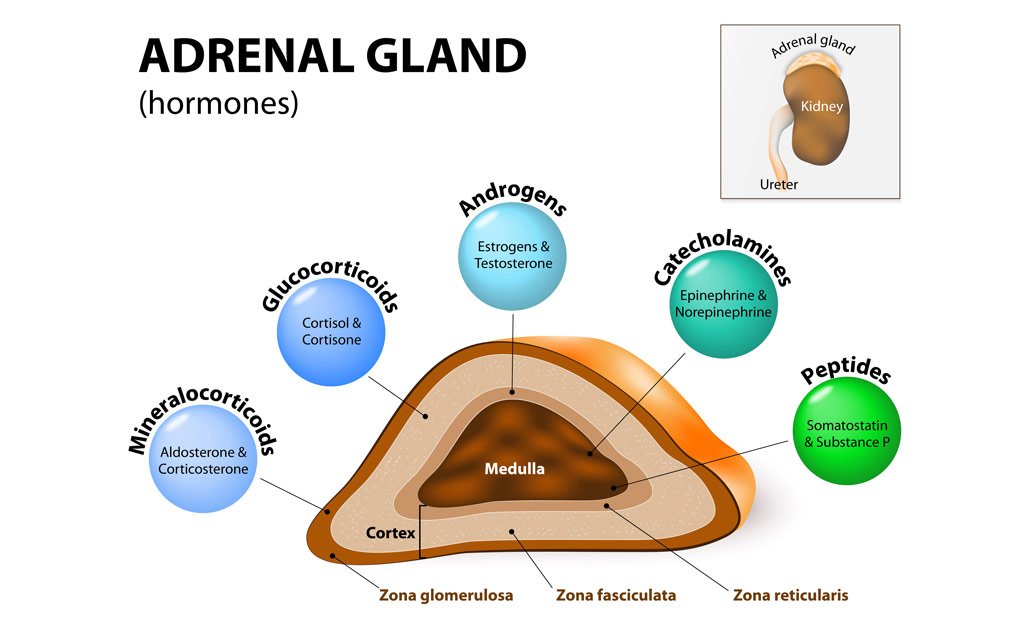Why Adrenal Health is Important During Menopause
Your ovaries and adrenal glands make various hormones to manage the ebb and flow of your physiology from menstruation to metabolism to sleep. But if any part of the chain isn’t working properly, your hormones will be out of balance and the impact on your health can be widespread. Your body is able to put up with long-term stress for many years. However the stress and sex hormone pathways lead back to the same place – the brain – and unfortunately, the stress response (because it’s essential to your survival) takes priority over sex hormone production.
Prolonged stress, therefore, can compromise ovarian and adrenal production.
Understanding adrenal fatigue
Since the precursors for oestrogens, testosterone (androstenedione and DHEA) and progesterone are produced by the adrenal glands in postmenopausal women, it means that optimal adrenal gland function is needed for a smooth menopausal transition - and to remain symptom-free during postmenopausal years.
If the adrenal glands must preferentially make high amounts of cortisol and DHEA due to chronic stress, they may not be able to keep up with the demand for sex hormone precursors.
In addition, high cortisol production has been associated with bone loss in both men and women. Furthermore, increased cortisol and epinephrine raise the body’s core temperature. Once the core temperature rises above the thermoneutral zone (above is where we sweat and below is where we shiver), hot flushes can be triggered as a way to get rid of excess heat.
Below are the common symptoms associated with adrenal fatigue:
- difficulty getting out of bed in the morning
- nocturnal waking
- anxiety, restlessness and mild depression
- low blood pressure
- reliance on sugar or caffeine to get you through the day
- problems coping with stressful situations
- struggling with energy throughout the day, but feeling awake at night
- abdominal weight gain
- hair loss
- cold intolerance
- decreased productivity, absentmindedness, and lack of mental focus
- feeling like everything is hard or overwhelming
Waning ovarian function for one to several years preceding the cessation of menses causes estradiol levels to fluctuate significantly. This usually occurs when a woman is in her mid to late 40s and is characterised by irregular periods. Continually decreasing levels of oestrogen results in vasomotor symptoms and increasingly frequent anovulatory cycles. After menopause, the adrenal glands produce androstenedione, which is converted by the aromatase enzyme (found in adipose tissue) into oestradiol (oestrogen).
An increase in body weight around the torso (belly region) is a common symptom of menopause. This occurs for a couple of reasons. Firstly, the body will gain weight in this area to ensure that oestrogen continues to be manufactured from the adipose tissue, enough to sustain a woman’s needs once her ovaries decrease their production of this essential hormone. Next, the body tends to store fat around this area when a woman is adrenally deprived, which is a common symptom among women struggling with menopause.
Achieving optimum adrenal health
Once we understand the body’s physiology we can then move to support its requirements by supplementing and formulating a treatment protocol specific to its needs. Naturopathic philosophy recognises the innate wisdom of the body and its attempts to facilitate preferred tendencies. Supporting healthy adrenal function before and during the menopausal transition can enable the adrenal glands to optimally perform their job in the production of sex hormone precursors.
How to optimise adrenal function:
- Identify stressors and improve stress management.
Prevention is the best cure. Helping women to differentiate between healthy, beneficial stress and detrimental stress is an important part of the education process. The body’s physiological responses to both types of stress are similar (cortisol production); however, necessary stress is a healthier and more short-lived threat to the body; whereas chronic stress can lead to adrenal exhaustion and related health complications.
Knowing what triggers stress and minimising these is imperative for any treatment program. Some essential and effective tools to reduce stress reactions are massage, counselling, craniosacral therapy, deep breathing, exercise, yoga and meditation. All these help retrain the nervous system to emphasise parasympathetic activity to initiate the relaxation response. - Test stress hormones to assess adrenal gland function.
- Treat the underlying cause of the adrenal insufficiency.
- Understand the three stages of the stress response (General Adaptive Syndrome).
General Adaptive Syndrome (GAS)
- Alarm Reaction (1st stage) - the initial “fight or flight” response to an acute stressor
- Resistance (2nd stage) - involves the Hypothalamus/Pituitary Axis and results in an increase in cortisol stress hormone output
- Exhaustion (3rd stage) - occurs when the body can no longer keep up with the demand for adrenaline and stress hormone synthesis.
Natural therapies to assist in stress management
Nutrient and botanical supplementation to support adrenal gland function provides nervous system integrity, reduces stress hormone production and creates a parasympathetic nervous system calm.
Common nutrients which support normal adrenal gland function and energy production include vitamin C, vitamins B5 and B6, magnesium, and tyrosine (an amino acid). Herbal supplements such as Licorice, Passionflower, Oats, Withania, Siberian Ginseng and Rhodiola also deliver great results.














